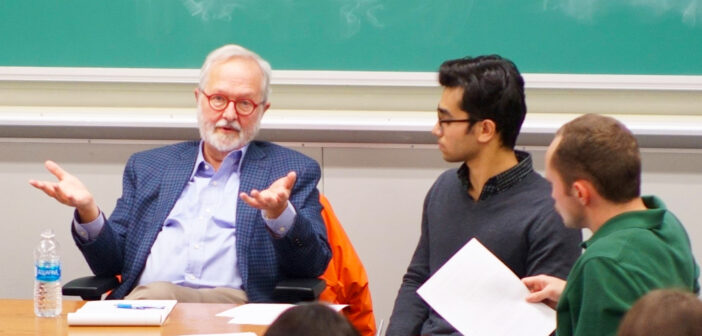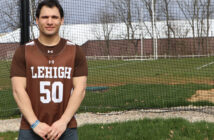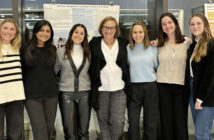With round red glasses atop his nose and a pink patterned tie around his neck, Richard Matthews enters Room 101 of Maginnes Hall.
He directs his 30-or-so students filling tables in two concentric U-shapes to Page 147 of their books.
With an open copy of Rousseau’s “The First and Second Discourses” atop his podium and the words “Part One, Second Discourse” etched upon the chalkboard, he paces before his Politics of Authenticity class with his hands in his suit-pant pockets.
He only inserts himself into the conversation to cold-call a student, to further a thought or to clarify an idea. This way, the students are the leaders of the Socratic discussion.
“I look at (the Socratic method) as kind of like a video game,” Matthews said. “You never know what’s going to happen.”
This teaching style is Matthews’ signature and has been for the entirety of his 36-year career as a Lehigh professor of political science, which will meet its end when he retires at the end of this semester.
His career has been one of breadth, and the way it began in no way suggested this particular conclusion. He’ll leave Lehigh with a lasting impression as a celebrated professor with a distinct approach. But 50 years ago, this teaching style may not have fit him as a student.
The summer of 1971 consisted of hard labor construction work for Matthews. He was fresh off a mediocre performance as a first-year at Muhlenberg College, and he needed money to supplement his education.
He spent his days building low-income housing in Allentown and enjoyed the work — that is, until his days began to an end at 7 p.m., his body fatigued from the moil and his hands blistered from the toil of the day. It was then that he realized carpentry was not a legitimate career choice for him.
“It convinced me I had better smarten up and start doing better in college,” Matthews said.
As a child, he had typical interests like basketball and baseball. Academics and politics were far out of mind then and didn’t interest him even when he started college.
“I don’t think anybody in their right mind when they’re young would be interested in political philosophy,” Matthews said. “I thought academics was the bane of my existence.”
However, during graduate school at the University of Delaware, he studied political theory and was able to experience the role of teaching. He found he loved to be in the classroom, and by the time he arrived at the University of Toronto to receive his doctorate under the instruction of the esteemed political theorist C.B. Macpherson, he was fully committed — fully committed to what he wanted to study, who he wanted to study with and what he would write his dissertation on.
He arrived at Lehigh in 1986 with a year-long fellowship from the National Endowment for the Humanities. He spent that year doing research for his second book, “If Men Were Angels: James Madison and the Heartless Empire of Reason,” and in 1987, he began teaching.
Today, he is the author of three books under university presses and the co-author of a textbook in its fifth edition, “The Philosophic Roots of Modern Ideology.” He said it’s rare he would write something that isn’t applicable to his classes, and while separate endeavors, the two branches of his work often intertwine.
Since his work focuses on political thought, it’s inevitably and constantly fueled by current events, requiring changes in direction and revisions as the political and social climate evolves. Inside his student-driven classes, these changes are taken into account.
While he said his students today are just as smart as they always were, he also said the average student today knows very little about their political system compared to generations past.
He took this into consideration last spring when he began his Intro to Political Thought course by telling his students what things were like when he was their age in the 1960s. “The turbulent ‘60s” were a time of social unrest, but the major difference between then and now, he said, is that none of the political institutions today are working.
“All the social movements that are going on now were at least an embryo (in the ‘60s),” Matthews said. “So in many ways, you are facing more of a crisis time than my generation, although we thought, ‘How could it get worse?’”
Andrew Davison, a student of Matthews in the early 1980s at Lafayette College, observed his attention to and understanding of current issues.
Now, Davison is a professor of political science himself at Vassar College and was Matthews’ co-author of “The Philosophic Roots of Modern Ideology.” Davison said being a teacher of political theory means you never “turn it off,” and Matthews was always in tune with imminent issues.
Today, issues like ecological fragility, racial inequality and gender oppression are prominent in most people’s minds in the United States, Davison said. But Matthews was teaching all of this in the ‘80s.
“In my experience in the academic world, (Matthews) was out in front of…most political science programs, or he was right at the cutting edge of it,” Davison said. “When it was important, he put it on the syllabus.”
Alisa Vukovic, ‘25, took Intro to Political Thought with Matthews as a sophomore. She said he carefully chose the content of each class and pushed students to be independent thinkers.
“When we did a class on women’s rights and what it feels like to be a woman in the workplace, he wanted the female students to lead it,” Vukovic said. “He acknowledged his limits of being a male professor who’s older, so he wanted us to take the reins on it.”
At Lafayette, Davison was continually surprised by Matthews’ receptiveness to students’ ideas, as he would sometimes admit that a student made him look at the content in an entirely new way. Given that Matthews had so much knowledge of the material, Davison decided to ask him if he had truly never thought about what the student suggested before.
“(Matthews) looked at me, and he said, ‘Always a student, Andrew, never only a teacher,’” Davison said.
Matthews said the students are what kept him at Lehigh for so long, and the Socratic method is what kept him alive. He learned to judge the quality of his teaching based on two things: the less he said and the quicker the time passed, the better the class.
With his once far-off retirement now becoming a quickly approaching reality, Matthews said he will not mourn his time at Lehigh, but will greatly miss it.
A career goes through cycles, some better than others, he said. For years, even particularly difficult ones in his life, he was eased by the fact that he had several hours a week inside the classroom where everything else would vanish.
“One of the things that I tried to get students to get directly or indirectly is that jobs should not be about money,” Matthews said. “If you find a job that allows you to sublimate your instinctual energy, it’s not work; it’s play.”






Comment policy
Comments posted to The Brown and White website are reviewed by a moderator before being approved. Incendiary speech or harassing language, including comments targeted at individuals, may be deemed unacceptable and not published. Spam and other soliciting will also be declined.
The Brown and White also reserves the right to not publish entirely anonymous comments.
4 Comments
I very much enjoyed the article on Prof. Matthew’s. While I attended Lehigh in the early ‘70’s as a “Government “ major. There was no “Political Science “ department. Yet many of the courses seem similar, but focusing more on the mechanics of governance. Dr. Matthew’s described us of the Socratic method brought back fond memories of Professors Whitcomb, Barry, Colon, and Dean Brockway of the Business College. It was excellent preparatory work for law school, with being prepared for class the key to success. I was always grateful for the foundation Lehigh gave me for my career as an attorney.
Professor Richard Matthews, the What do you mean by that? What is the counterargument? Can you give me an example? How do you know that? fellow who has introduced hundreds of Lehigh students to the Socratic method is going to retire. His teaching of Critical thinking has life long benefits, if pursued persistently and earnestly. I know Matthews well and his chief virtues play out in the pursuit and love of the truth. His many admirers already know this.
To round out Matthews’ influence a bit more, he also embraces the “truth” of Art and not just the Art that demonstrates political concern. His synthetic brain sees Art as a means to maintain freedom of thought through individual expression and the critique it offers society’s foibles.
Dr. Matthews “love of the truth ” is his chief virtue. His retirement is well deserved. He will be missed in the classroom .
What a great article! Thank you Dr. Matthews for your classes and mentorship.
I had Professor Matthews in his first year at Lafayette College in 1978 and I took about 5 other classes he taught in my time at Lafayette College. I can say without a doubt that he was a transformational professor and the best I ever had both at Lafayette and in law school. Lehigh and its students were so fortunate to have Professor Matthews, his incredible mind, his thought provoking teaching style and his caring and friendly nature for 36 years.